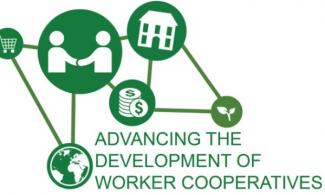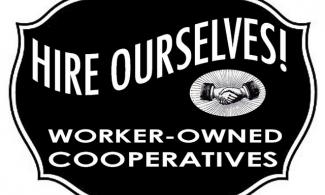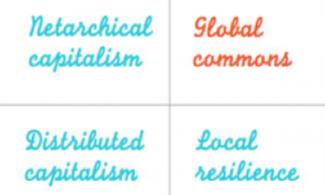
Originally published in Stir to Action
In September 2023, I joined the New Economies gathering in Rotterdam, hosted by the international philanthropic fund Partners for a New Economy. Convening 180 ‘changemakers’ from across Europe and the US, it was an opportunity to catch up on the latest developments across a movement to redesign the economy, with sessions on the impact of inequalities between the Global North and South, the consequences of international debt and currency hierarchies, the disruptions of AI technologies, and tensions surrounding the extractive role of private capital in green infrastructure investment.
Beyond addressing these particular political and economic trends, the one-day conference principally focused on how this loose movement of NGOs could “move new economic thinking from the margins to the mainstream”. The opening keynote speaker, Katherine Trebeck, co-founder of the Wellbeing Economy Alliance, stressed the importance of efforts to create “public momentum” and the necessity of “reaching people in ‘flyover towns’ in the US and in Brexit-voting villages in England”. The following panel then reinforced the scale of these challenges by exploring how we “build a bigger tent” to go far beyond our current – and narrowly constituted – movement.
Ultimately, though, these discussions failed to present any serious analysis of why this movement’s memberless NGOs might be intrinsically incapable of becoming “levers for collective action”. Instead of investigating why NGOs might not be a “substitute for mass membership organisations”, as the political historian Anton Jäger argues in his 2022 article, ‘From Bowling Alone to Posting Alone’, the routine response to the weaknesses of a highly fragmented sector of professional organisations is to call for more collaboration. But given how often we hear about the failure of new economic approaches to engage the wider public, should we not invest more time in understanding the connection between our current marginalisation and this specific – and undemocratic – NGO model?
The last several decades in civic society have been quite different from the preceding centuries. Though civil society has always been plural, ranging from public charities to family trusts to mutual societies, the density of democratic membership bodies – those organisations supported and controlled by their members – have always been a critical part of social change. Whether these were ‘leagues’, ‘federations’, ‘societies’, or ‘unions’, they offered legal membership to their members and active participation in their respective cause. But over the last generation, a new civic universe of think tanks, civic labs, and campaign bodies – a sector of ‘advocates without members’ – have both displaced and replaced these representative bodies. Essentially, these changes have removed the effective basis for collective power across and between politics, civil society, and business.
So, why has civil society become such a monoculture? If you look back at the story of the last 40 years or so, the narrative mainly focuses on the rise of neoliberalism in terms of the devastating effects of economic privatisation. But there’s another, and often ignored, part of this story – the collapse of civil society. This structural transformation, a process we should more explicitly understand as ‘civic privatisation’, primarily involved the hollowing out or closure of membership organisations. Such membership bodies with popular and subnational roots, and with clear lines of democratic accountability to their publics, were replaced with professionalised staff-driven NGOs and consultancy bodies offering advocacy services to passive beneficiaries. This “advocacy explosion”, as political theorist Theda Skocpol outlines in Diminished Democracy: From Membership to Management, not only left civic life reliant on hired experts, but has also undermined our ability to build power around alternative propositions outside the political mainstream.
Despite this loose movement’s calls for mass involvement in ‘new economies’, our civic universe is not currently based on engaging people in collective efforts to build political power and act in their own interests. Typically, it encourages ‘citizens’ to participate as occasional donors or signatories to campaigns, or through informal involvement in social activism. Even when there is deeper involvement in civic initiatives, almost everything is still prescribed by staff and funding bodies. The current domination of the memberless NGO model in social reform has, as academic Matthew Thompson puts it, created a “professionalised and marketised shadow of civil society’s former self”.
Most recognise this trend in party politics, where vehicles that once represented distinct social values and interests have increasingly converged into a vacuous and destructive battle over a narrowly defined centre ground. Though our current political system is partly the failure of parties to respond to new changes in social class in the post-war era, it is also the result of the political party’s ‘electoral machine’ becoming separated – and considered more important – than its membership base, as Carlo Invernizzi Accetti and Christopher Bickerton argue in their recent book Technopopulism: The New Logic of Democratic Politics. In the case of New Labour, the party intentionally weakened the role of trade unions and other organised groups to empower its leadership at the expense of its members.
This separation between civil society and politics also produces another apparent trend, one which points to the democratic deficiencies of the memberless model. In the absence of mass membership organisations, it has been a necessity for policy makers and think tanks to use techniques drawn from modern politics via corporate marketing, in which the public are segmented via behavioural and demographic characteristics, before being targeted for polling and public attitudes testing. In this case, democratic participation is reduced to a competitive market of retail politics and, as such organisations are no longer driven by members, we are left with external ‘experts’ using science, data, and other techniques to study voters to determine future policy decisions.
Taken together, these connected trends play a major part in the dissatisfaction with modern politics that has driven the rise of populism in recent decades. The work of Kurt Weyland, Professor of Government, University of Texas at Austin, argues that such an anti-institutional environment has created the opportunity for “personalistic leaders to exercise government power based on unmediated support from large numbers of unorganised followers.” At the same time, it creates a situation where it is increasingly difficult to build the lasting coalitions of political power outside of the mainstream that are necessary to achieve ‘new economies’, as the legitimacy of such hollowed out institutions is not directly based on members’ interests, but an ever-shifting baseline of ‘public opinion’.
Efforts exist to push back against this privatisation of civic society and to create new forms of democratic deliberation. But too often, as in the case of Citizens’ Assemblies, they are episodic and ephemeral, rather than building lasting institutions and coalitions of collective power. Or, as in the case of many technological solutions that aggregate individual preferences, they only reinforce the sense of disempowerment, as citizens feel too small to significantly affect civic and political life.
If the ‘new economies’ movement is to become a political force, it needs to be part of a rapid re-institutionalisation of society. Undoubtedly, this is no easy task, but there are many places to start. For instance, we could scale up existing ‘legacy’ institutions whose policy development is still led by their members, use electoral models, and have tiered layers of governance, from the local to the regional to the national level. There are also social movement bodies who currently have no membership structure, which could be converted into democratic organisations, offering their current ‘members’ the ability to formally support and direct their organisational strategies.
The call for a return to membership democracy across civil society is not to dismiss the advances of progressive NGOs and social activism over recent decades. We obviously need a new form of institutionalism, not simply a return to the past, and there is much inspiration to be found in this period’s experimentation. Such new approaches to participation and governance can positively inform how membership bodies can increase and improve internal democracy to ensure they are meaningfully controlled by their members.
In future gatherings we need to look more directly at how we can stimulate a new structural transformation of civil society. It will be a broad process that explores how we can rebuild democratic power to facilitate mass involvement in civil society and, by extension, our political system. Though there seems to be an instinctual knowledge of this problem, many are unaware of this prehistory of civil society, and understandably find it difficult to see an alternative to the memberless NGO, whose unelected governance, unreliable funding streams, and informal support base is inadequate to the challenges of the present, let alone the disruptions of the future.
In our work at Stir to Action, our interest in resurfacing democratic values and models is a key driver in our focus on democratic business ownership. Our new Centre for Democratic Business is actively working on this agenda with partners including local and regional government, industry bodies, membership associations, and foundations to advance the role of democracy in our workplaces and communities. At the same time, we also know that business is simply one aspect of our wider ‘political economy’, and we’ll only see a substantial shift if we reverse the logic of privatisation in civic life, too. Fortunately, in the movement for new economies, there is the basis for a coalition that has the capability to take on this challenge and succeed. ∞
Illustration by Guillermo Ortego





Add new comment